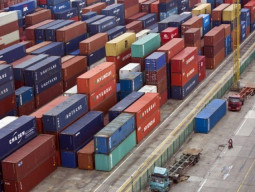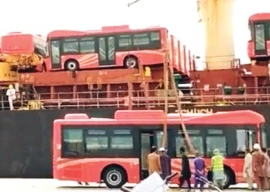
The explosive, hidden inside a passenger car, was set off in the middle of the day in the capital of Pattani province, one of three Muslim-majority states wracked by rebellion in the kingdom's southern tail. "The bomb was put in a Honda Jazz, which was stolen from a nearby village this morning," provincial police commander Major General Thanongsak Wangsupa told AFP.
 PHOTO: AFP
PHOTO: AFPMore than 6,000 people have died in 10 years of near-daily violence between state security forces and the loose network of Muslim insurgents, who are seeking greater autonomy from Buddhist-majority Thailand, which annexed the region a century ago.
Five Pakistanis arrested in Thailand for involvement in fake passports ring
Saturday's bomb injured at least six police officers and one civilian and sent plumes of black smoke streaming into the sky. The wounded have been hospitalised for burns and other critical injuries from the explosion, emergency workers said.
Thailand's military, which seized control of the entire country in a 2014 coup, has been reaching out to some representatives from the shadowy insurgent network in an effort to start full-scale peace talks. Similar negotiations spearheaded by the former ousted government faltered amid criticisms that they did not include representatives from all of the militant factions.
The island hop: Exploring Thailand
Details on the internal workings of the insurgent network are scant, as the groups rarely make public statements or claim responsibility for their attacks. Critics have cast doubt on the junta's peace efforts, pointing to routine human rights violations in the region that have bred a deep mistrust of the military among locals. The region has been governed by emergency laws for the past decade that grant authorities sweeping powers to arrest and detain suspects without warrants.
In a report released earlier this year, rights groups accused the army of torturing scores of detainees with impunity in its efforts to extinguish the rebellion. The report's researchers said the situation has deteriorated since Thailand's 2014 coup.




































1713853507-0/MalalaHilary-(2)1713853507-0-270x192.webp)







COMMENTS
Comments are moderated and generally will be posted if they are on-topic and not abusive.
For more information, please see our Comments FAQ